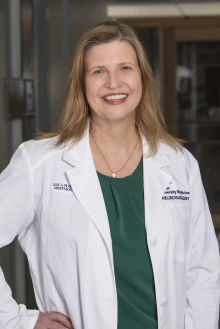Julie Pilitsis to serve as president of neurosurgery society
Julie G. Pilitsis, MD, PhD, MBA, a professor and chair of the Department of Neurosurgery at the University of Arizona College of Medicine – Tucson, has been elected president of the American Society for Stereotactic and Functional Neurosurgery.

Julie G. Pilitsis, MD, PhD, MBA
“The ASSFN has really been at the forefront of neurosurgery since its inception,” said Pilitsis. “I remember being a trainee and attending these meetings and meeting the officers who spent time getting to know me and what I wanted to do. So, for me, the presidency is a great honor and opportunity to pay forward all the great things that so many mentors in the field have done for me.”
Pilitsis first joined the society in 2008 and became an executive board member in 2012.
“One of the most meaningful things I have done while serving on ASSFN was setting up a mentorship committee for fellows and residents interested in our specialty,” she said. “Specifically, we assigned mentors, got the group together and provided content on the basics you need to know about all aspects of functional neurosurgery. This is particularly important in this specialty because not all fellowships look the same. Some focus on pain. Some focus on deep brain stimulation. Some focus on epilepsy. Some focus on radiosurgery. By being able to help supply those fundamentals to the group at large, that was very meaningful to me.”
“Another great experience was serving as an officer during the ASSFN strategic planning process. Being able to work with the team to give the society direction and serve our members to the fullest was highly rewarding.”
Pilitsis, who joined the university in January, is also a physician executive for functional neurosurgery at Banner – University Medicine.
“I've been lucky to join a robust functional neurosurgery program with Paul S. Larson, MD, and Martin E. Weinand, MD, already paving the way,” she said. “We have several movement disorder neurologists, interested psychiatrists and so many partners in science and engineering to build this program. My goals include making the College of Medicine – Tucson a functional neurosurgery destination center and affecting care in the specialty over the Banner system.”
Weinand said, “Dr. Julie Pilitsis brings state-of-the-art functional neurosurgical experience and expertise to the University of Arizona. Her patient-care and research experience will significantly enhance the academic mission of the College of Medicine – Tucson and the University of Arizona and support expert functional neurosurgical care for the region.”
Larson added, “As a teacher, she has already made a huge impression on the next generation of clinicians and scientists by mentoring 120 students and counting. I cannot wait to see what the next chapter of her already storied career will bring as she leads our department into its next phase.”
Pilitsis, who is also a member of the BIO5 Institute, said, “I think one of the things that really attracted me to the University of Arizona was the ability to talk to so many different people with diversity of thought and different backgrounds. The community is very welcoming, from the clinic to the basic sciences and engineering. This is just such an intellectual environment to practice medicine in.”
The society was founded by Philip Gildenberg, MD, PhD, who was also the founding chair of neurosurgery at the College of Medicine – Tucson.
“I'm honored to be in this role based on the legacy he developed,” Pilitsis said.

